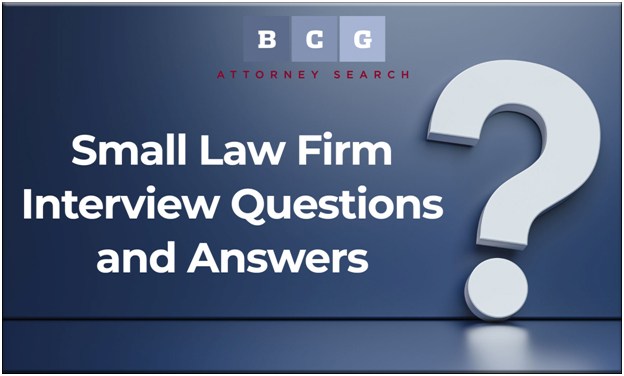
- What ties do you have in this community?
Do's: Emphasize your connection to the community and understand its needs. Provide examples of your involvement in local organizations or events.
Don'ts: Don't downplay the importance of community ties, especially for small firms. Don't pretend to have a connection to the community if you don't.
- What is your understanding of how a small firm operates?
Do's: Show that you have researched and understand the unique challenges and benefits of working for a small firm. Emphasize your willingness to work collaboratively with others.
Don'ts: Don't assume that small firms operate similarly to larger firms. Refrain from downplaying the importance of a small firm's personal and collegial atmosphere.
- Why do you want to work with a small firm? How hard are you prepared to work?
Do's: Emphasize your enthusiasm for working for a small firm and your willingness to work hard and take on multiple responsibilities.
Don'ts: Don't appear as if you're only interested in a small firm as a backup option. Don't make unrealistic promises about your work ethic.
- How would our firm satisfy your interests? What specific aspect of our work would be agreeable to you?
Do's: Show that you have researched the firm and understand its areas of practice and values. Emphasize what aspects of the firm's work align with your interests and values.
Don'ts: Don't pretend to be interested in areas of the firm's work that don't align with your interests or values. Be specific and concise in your answer.
- If we hired you, at what salary do you expect to start?
Do's: Be prepared to discuss salary expectations but emphasize that compensation is not your most important factor.
Don'ts: Don't provide an exact figure without researching or understanding the position and the firm's compensation structure. Don't appear solely focused on salary.
- How much court work do you expect to do? Is that experience essential to you?
Do's: Show that you are open to doing court work and transactional work. Emphasize the importance of developing your legal skills and understanding the legal system.
Don'ts: Don't appear inflexible or unwilling to do court work. Don't suggest that court experience is not valuable.
- Do you consider yourself an easy person with whom to get along? Explain.
Do's: Show that you have good interpersonal skills and are willing to work collaboratively with others. Provide specific examples of how you have demonstrated these qualities in the past.
Don'ts: Don't suggest that you are difficult to work with or have a negative attitude. Don't provide irrelevant or unimportant details.
- In what environments do you work most effectively and efficiently? Do you feel comfortable with supervision or work best on your own?
Do's: Show you adaptability and flexibility in different working environments. Emphasize the importance of clear communication and collaboration.
Don'ts: Don't suggest that you only work well in one environment. Refrain from downplaying the importance of clear communication and collaboration.
- How much responsibility can you assume from the start? Explain.
Do's: Show that you are willing to take on multiple responsibilities and help the firm succeed. Emphasize your commitment to providing excellent service to clients.
Don'ts: Don't appear hesitant or unwilling to take on responsibility. Don't suggest that you are only interested in a narrow range of tasks.
Overall, it's important to prepare thoughtful and honest answers to these questions and demonstrate that you have researched the firm and understand its values, culture, and areas of practice. Be sure to emphasize your relevant skills, experience, and personal qualities, and show enthusiasm for learning and growing as a legal professional. Remember that small firms often value a personal and collegial atmosphere, so it's important to emphasize your ability to work collaboratively with others and build strong relationships with colleagues and clients.
Conclusion
Preparing for a law firm interview requires careful research and thoughtful reflection. By understanding the firm's values, areas of practice, and culture and by being able to articulate your relevant skills, experience, and personal qualities, you can increase your chances of success in the interview process. The sample answers and tips provided in this article are a starting point to help you prepare for a law firm interview at a small firm. Remember to be honest, enthusiastic, and professional in your responses and demonstrate your willingness to learn and grow as a legal professional. Emphasize your adaptability, interpersonal skills, and commitment to providing excellent client service, which is often highly valued in small firms.





